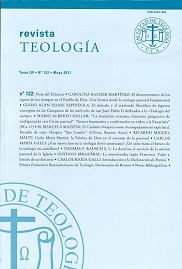Mercy according to Pope Francis. Value and Limits of a Discourse
Palavras-chave:
Francisco, misericordia, Perdón, Amoris laetitia, Situaciones irregulares, Debates éticosResumo
The centrality of mercy in Francis’ teachings, on the one hand shows a continuity with the preceding pontiffs, especially since John XXIII, but on the other hand represents an original contribution: mercy purports the primacy of the concrete person over the system (structures, norms or doctrine). This originality, nevertheless, is currently rather an intuition than a clear and consistent teaching. Through the problem of the “so called” irregular situations in Amoris laetitia this work shows that, in the present moral debates, his univocal understanding of mercy as a pastoral attitude of pardon and refusal to judge hearts sometimes becomes a relativization of the objective ethical judgment of actions, which seems to put at stake the doctrine of moral absolutes. Only a more differentiated vision of mercy, that includes beyond its pastoral function a normative one, will be able to realize its centrality, which is the centrality of the person herself.
Downloads
Downloads
Publicado
Como Citar
Edição
Secção
Licença
Direitos de Autor (c) 2018 Teología

Este trabalho encontra-se publicado com a Licença Internacional Creative Commons Atribuição-NãoComercial-CompartilhaIgual 4.0.














 Teología
Teología